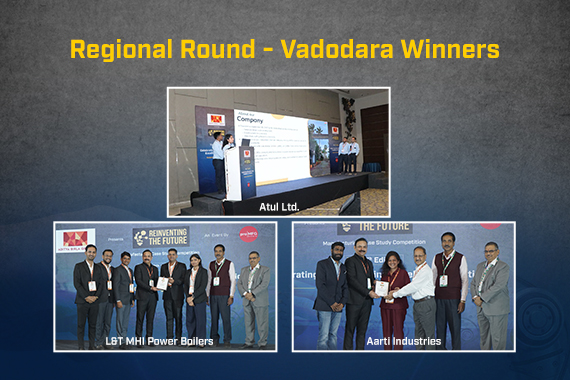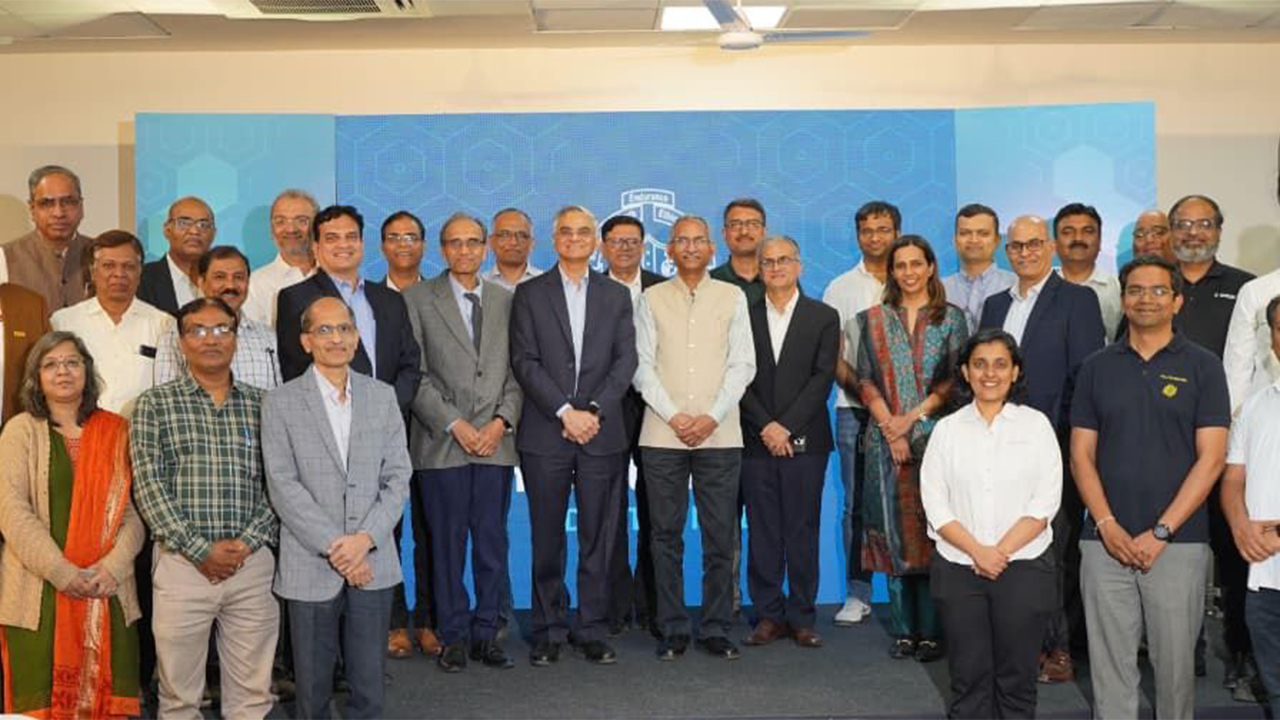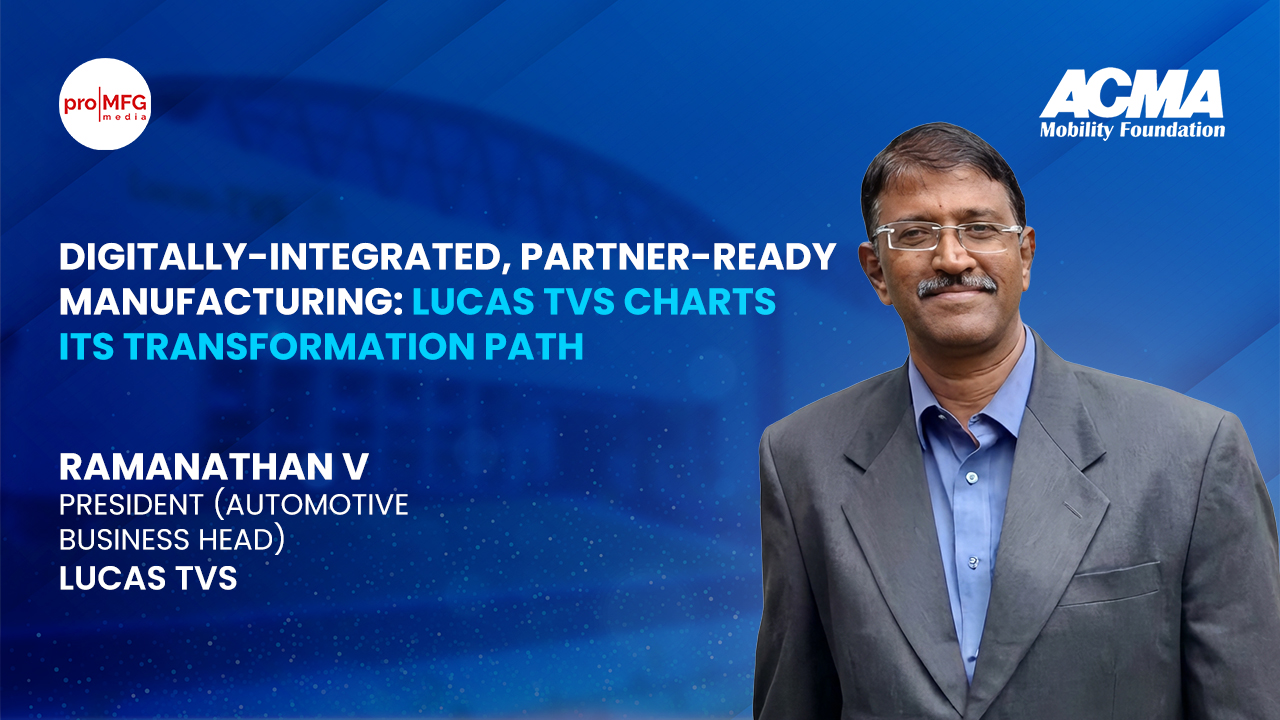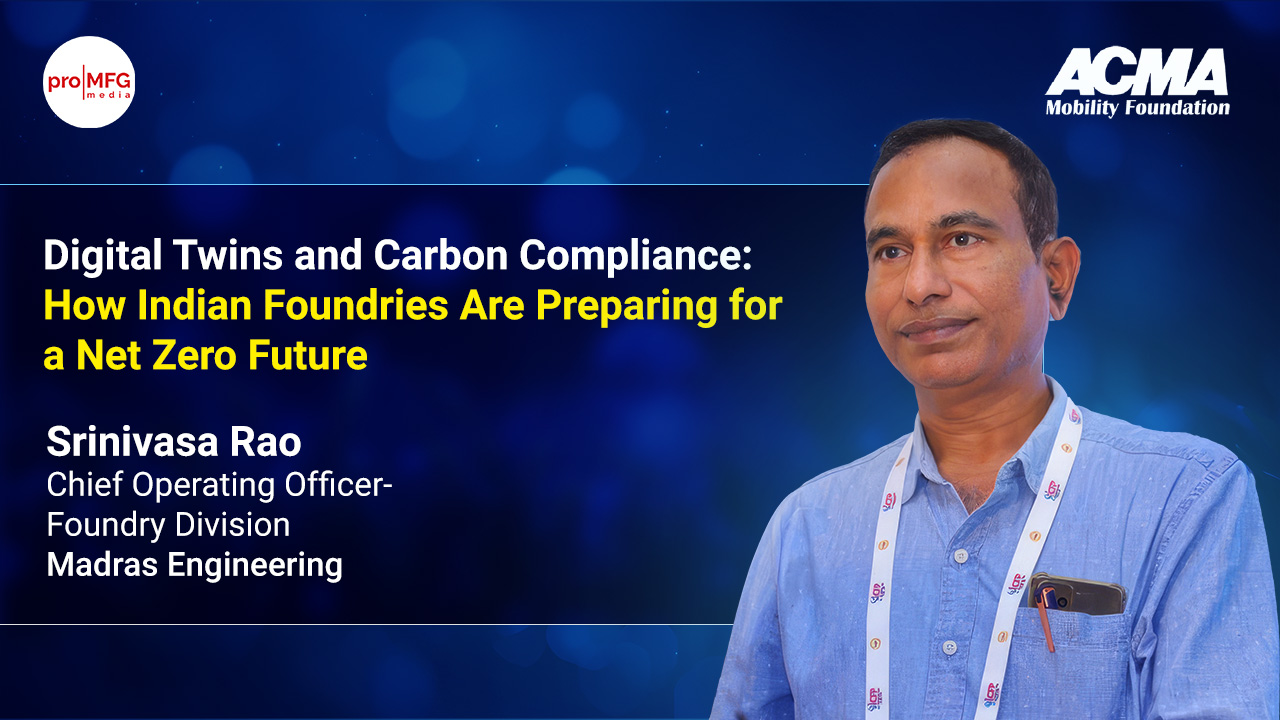Smart Manufacturing - Champions of Change
#ChampionsOfChange #Innovation #SmartManufacturing #RockwellAutomation #DigitalTransformation #CXORoundtable

December 2024 : The recent CXO Roundtable, presented by Rockwell Automation and powered by Pro MFG Media, supported by the Automotive Component Manufacturers Association of India (ACMA) & AMTDC -IIT Madras, brought together leaders from top manufacturing organizations to discuss the transformative impact of smart manufacturing on the industry. The Indian manufacturing sector is at a pivotal point of transformation, driven by cutting-edge technological advancements and smart manufacturing initiatives. This roundtable focused on innovative solutions that connect, automate, track, and analyze manufacturing operations, thereby improving efficiency and productivity.

Murali Manohar, Head of Enterprise Software Solutions India & SE Asia at Rockwell Automation & Mr. Anthony Murphy, Vice President, Product Management, Plex Systems kicked off the event by emphasizing the critical role of data in driving AI initiatives within manufacturing and developing a roadmap for gradual digital transformation, starting with high-impact use cases and building organizational readiness.
With 811 nominations representing more than 265 manufacturing plants from across the country, the QuPID Awards reflected the growing recognition and prestige of the platform, solidifying QuPID's position as a premier celebration of manufacturing excellence in India.

The event featured a dynamic exchange of ideas led by Manish Kulkarni, Director & Co- Founder, Pro MFG Media, who engaged in conversations with industry leaders from renowned organisations including Tata AutoComp Hendrickson, Kalyani Group, Force Motors, Sany, Tata AutoComp, Kalyani Forge, CIE Automotive, Mahindra Accelo, Faurecia Clean Mobility, Robert Bosch Chassis Systems, Magna Automotive India Private Ltd., and the Automotive Component Manufacturers Association of India (ACMA).

Discussion Highlights
1. The State of Digital Maturity and Key Challenges
The participants acknowledged the significant strides made in adopting smart manufacturing technologies but emphasized the need for a clearer roadmap to achieve digital maturity. Major pain points identified included:
● Integration of legacy systems with modern digital solutions.
● Workforce resistance to change, requiring a cultural shift and leadership
commitment.
● Cybersecurity concerns in increasingly connected environments.
2. Cross-Industry Strategies for Smart Manufacturing
Leaders from diverse sectors shared unique approaches to implementing smart manufacturing. Common best practices identified included adopting scalable solutions, fostering collaboration between IT and OT teams, and leveraging data-driven insights for decision-making.
Distinguished Panelists
The CXO Roundtable on "Smart Manufacturing - Champions of Change" brought together an esteemed panel of industry leaders and experts, whose insights and experiences enriched the discussion. The panelists included:
● Mr. Murali Manohar, Head of Enterprise Software Business – India & SE Asia,Rockwell Automation India
● Mr. Anthony Murphy, Vice President, Product Management, Plex Systems
● Mr. Vinod Chinanavar, Head IT, Tata AutoComp Hendrickson
● Ms. Bhawna Dhiman, Head of Transformation & PMO, Kalyani Group
● Mr. Vivek Gosain, VP Production Engineering & Tool Room, Force Motors
● Mr. Kishor Hole, Head IT, Sany
● Mr. P.C. Jayan, BU Unit Head Technical Center, Tata AutoComp
● Mr. Viraj Kalyani, Managing Director, Kalyani Forge
● Mr. Shailesh Kulkarni, IT Head and Business Controller, Stampings, Gears & Iron Castings Division, CIE Automotive
● Mr. Chandrakant Naphade, Business Unit Head, Mahindra Accelo
● Mr. Shailesh Sharma, Director of Manufacturing, SKF ISEA
● Mr. Kedar Taskar, Managing Director, Faurecia Clean Mobility
● Mr. Avinash Chintawar, Managing Director, Robert Bosch Chassis Systems
● Mr. Diptikesh Kotphode, Head of Information Technology, Magna Automotive India
Private Ltd.
● Ms. Ashwini Kulkarni, Director - Western Region, ACMA


Key Takeaways and Strategic Insights
Leveraging Data for Operational Excellence
● The roundtable emphasized the importance of real-time monitoring and analytics to
improve quality, productivity, and decision-making.
● Metrics like Overall Equipment Effectiveness (OEE) were highlighted as critical
benchmarks for assessing performance.
Simplifying Automation for the Workforce
● A user-friendly approach to automation is essential for successful adoption.
Participants advocated for intuitive interfaces and simplified workflows to ease the
learning curve for shop-floor operators.
● Upskilling programs and a focus on digital skills were discussed as pivotal to
workforce empowerment.
Adoption and Integration of Advanced Technologies
The integration of technologies like AI, Machine Learning (ML), IoT, and Cloud platforms has begun to reshape manufacturing operations. Key insights included:
● Real-time data platforms drive innovation by offering predictive insights and
operational visibility.
● SAAS-based and cloud platforms were praised for their ability to facilitate seamless,
real-time decision-making while reducing infrastructure costs.
Overcoming Barriers to Smart Manufacturing
The group identified several strategies for overcoming common adoption challenges:
● Aligning Manufacturing Execution Systems (MES) and Enterprise Resource Planning
(ERP) with corporate digital transformation strategies.
● Starting with high-ROI pilot projects to build confidence and demonstrate value.
● Engaging the workforce and unions early in the transformation journey to minimize
resistance.
Leadership and Cultural Transformation
● Leadership maturity was highlighted as a critical factor for driving smart
manufacturing initiatives. CXOs discussed the importance of fostering a culture of
innovation, collaboration, and continuous learning.
● Strong communication, transparent goals, and visible leadership support were
identified as enablers of successful digital transformation.

Roadmap for Smart Manufacturing
1. Evaluate Digital Maturity and Prioritize Pain Points
o Begin with a comprehensive assessment of current digital capabilities and
identify areas for improvement.
o Focus on addressing integration issues, workforce readiness, and
cybersecurity challenges.
2. Simplify Automation for Shop-Floor Teams
✔ Implement intuitive and user-friendly tools that align with workforce skill
levels.
✔ Develop robust training programs to upskill employees on new technologies.
3. Ensure Seamless System Integration
✔ Connect MES, ERP, and IoT platforms for a unified data flow across the
value chain.
✔ Leverage scalable cloud-based solutions for real-time visibility and
operational agility.
4. Adopt a Step-by-Step Transformation Approach
✔ Focus on small, high-impact use cases with measurable ROI before scaling
initiatives.
✔ Use early wins to build organizational readiness and stakeholder confidence.
5. Empower Leadership and Foster Cultural Change
✔ Cultivate a leadership mindset that prioritizes innovation, collaboration, and
long-term vision.
✔ Align technology adoption with clear communication and engagement
strategies for employees.
NEWSLETTER
TRENDING ON PRO MFG
MORE FROM THE SECTION









